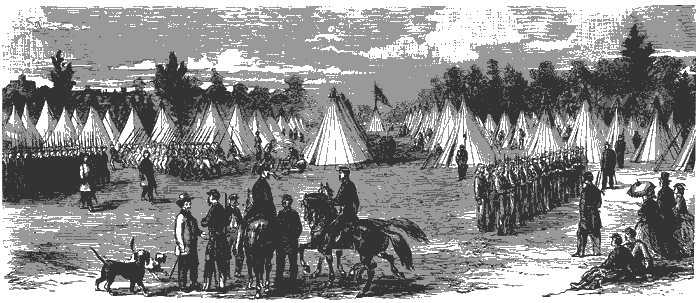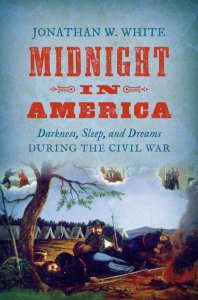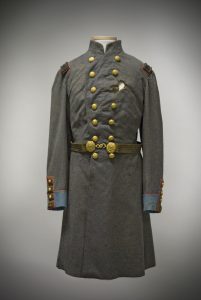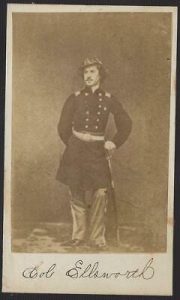We Are Such Stuff as Dreams: Ellsworth Predicts His Death

Boys, no doubt you felt surprised on hearing my orders to be in readiness at a moment’s notice, but I will explain all as far as I am allowed. Yesterday forenoon, I understood that a movement was to be made against Alexandria. Of course, I was on the qui vive. I went to see General Mansfield, the commander at Washington, and told him that I would consider it a personal affront if he would not allow us to have the right of the line, which is our due, as the first volunteer regiment sworn in for the war. All that I can tell you is to prepare yourselves for a nice little sail, and, at the end of it, a skirmish. Go to your tents, lie down, and take your rest until two o’clock, when the boat will arrive, and we go forward to victory or death. When we reach the place of destination, act as men; do nothing to shame the regiment; show the enemy that you are men, as well as soldiers, and that you will treat them with kindness until they force you to use violence. I want to kill them with kindness. Go to your tents and do as I tell you. [1]
With these words, Colonel Elmer Ellsworth bade his 11th New York Fire Zouaves a good night, turned, and walked toward his own tent. There he wrote two letters. One was to his parents. These words were penned on the back of a Brady carte-de-visite:
The regiment is ordered to move across the river tonight . . . I am inclined to the opinion that our entrance to the city of Alexandria will be hotly contested . . . Should this happen my dear parents it may be my lot to be injured in some manner. Whatever may happen cherish the consolation that I was engaged in the performance of a sacred duty– and tonight thinking over the probabilities of the morrow and the occurrences of the past I am perfectly content to accept whatever my fortune may be, confident that He who noteth even the fall of a sparrow will have some purpose even in the fate of one like me. My Darling and ever-loved parents, good bye. God bless, protect, and care for you. Elmer [2]
The other was to his fiancée, Carrie Spafford:
My own darling Kitty,
My regiment is ordered to cross the river and move on Alexandria within six hours. We may meet with some warm reception and my darling among so many careless fellows one is somewhat likely to be hit. If anything should happen–Darling just accept this assurance, the only thing I can leave you–the highest happiness I looked for on earth was a union with you. You have more than realized the hopes I formed regarding your advancement–and I believe I love you with all the ardor I am capable of. You know my darling any attempt of mine to convey an adequate expression of my feelings must be simply futile. God bless you as you deserve and grant you a happy and useful life and us a union hereafter. Truly your own, Elmer.[3]
P.S.–Give my love to mother and father (such they truly were to me) and thank them again for all their kindness to me–I regret I can make no better return for it–Again Good bye. God bless you, my own darling.[i]
Both letters mention the possibility that Ellsworth might be wounded or killed during the military takeover of Alexandria, Virginia, planned for the night of May 23-24, 1861. Colonel Ellsworth did not think he would survive.
 Sleep comes in fits and starts some nights, especially since Covid-19 became a reality. There are many articles about dream disruption due to Covid-19. Apparently, stress of any kind disrupts dreams. I read several articles about virus dreams, and then remembered I had Jonathan White’s excellent Midnight in America: Darkness, Sleep, and Dreams During the Civil War. White discusses the dreams of Civil War soldiers and civilians mentioned in war correspondence. The book is not an analysis of those dreams, but a recounting of them. White looks for similarities among the dreams, seeking patterns and making comparisons of dream intensities. Several dreams appear to predict impending death, although most dreams are of home, family, and physical closeness. [4]
Sleep comes in fits and starts some nights, especially since Covid-19 became a reality. There are many articles about dream disruption due to Covid-19. Apparently, stress of any kind disrupts dreams. I read several articles about virus dreams, and then remembered I had Jonathan White’s excellent Midnight in America: Darkness, Sleep, and Dreams During the Civil War. White discusses the dreams of Civil War soldiers and civilians mentioned in war correspondence. The book is not an analysis of those dreams, but a recounting of them. White looks for similarities among the dreams, seeking patterns and making comparisons of dream intensities. Several dreams appear to predict impending death, although most dreams are of home, family, and physical closeness. [4]
Lincoln’s dreams get a chapter of their own. White questions the truthfulness of Lincoln’s two dreams of death premonitions, debunking one, and supporting the veracity of the other. In an interview with the National Museum of Civil War Medicine’s Jake Wynn, done as part of the museum’s online offerings created for Covid-19, White discusses both visions. https://www.facebook.com/CivilWarMed/videos/607750483418435/ One is the dream wherein Lincoln is on a boat headed toward an unknown shore. Lincoln claimed he had had this dream before several major military engagements. In the other, Lincoln is awakened by the sounds of people crying in the Executive Mansion. He comes downstairs, sees a catafalque with a coffin upon it, and asks who is dead? The answer is, “The President. He has been assassinated.”[5]
Is it possible to predict our own death? I do not think there is an answer to that question, but I do think it is interesting that Colonel Elmer Ellsworth was able to predict his. Colonel Ellsworth asked Captain John “Jack” Wildey to come to his tent after 1:00 AM to help him dress for his first mission as a commanding officer. Ellsworth had laid his uniform out on the camp bed. He stood quietly, as if thinking over his choices, and then said to Wildey, “I was thinking in what clothes I shall die.” Wildey laughed and tried to cheer him up with a few joking words, but Ellsworth shook his head, saying nothing for a moment. Then, smiling, he went to his trunk and opened it. He withdrew an entirely new uniform, tagged and packaged from the tailor. “If I am to be shot tomorrow, and I have a presentment that my blood is immediately required by the country–it is in this suit that I shall die.” Wildey helped him put on the new uniform, and within moments Ellsworth was his usual confident self. Wildey wound the red silk officers’ sash around Ellsworth’s narrow waist. This was the uniform in which Ellsworth died early on May 24. [6]

Is a presentment the same as a dream? Ellsworth has left no record of his dreams, but we do have Francis Brownell’s version of a conversation with Wildey. Maybe it is all just second or third-hand nonsense. Certainly, Ellsworth felt the stress of his first real military engagement. Or perhaps it was the same sort of Shakespearean dream that Covid-19 has given many of us–full of sound and fury, signifying nothing. Even Dr, White has no definitive opinion. His book helps readers understand how 19th century, war-weary Americans wrestled with their fears and desires as they slept. Still, it does not answer the questions concerning the truthfulness of dream prophecies.
May 24 is the 159th anniversary of Colonel Ellsworth’s death. Dream prophesy or not, it is worth our while to Remember Ellsworth.
_____________________________________________
[1] Frank Moore, ed., The Rebellion Record: A Diary of American Events with Documents, Narratives, Illustrative Incidents, Poetry, etc., (New York: G. P. Putnam, 1862), 57.
[2] Elmer Ellsworth to Ephraim and Phebe Ellsworth, May 23, 1861. KCWM/LFAC.
[3] Elmer Ellsworth to Carrie Spafford, May 23, 1861. KCWM/LFAC.
[4] Jonathan W. White, Midnight in America: Darkness, Sleep, and Dreams During the Civil War, (Chapel Hill: University of North Carolina Press, 2017).
[5] Ibid, 149-172
[6] Francis Brownell, Philadelphia North American, circa May-June, 1861 and quoted in Ingraham, Zouaves of ’61, 148.

Do we know any more about Kitty’s life?
Carrie Spafford was never able to get over Ellsworth’s death. She married, had a son, outlived them both, and was forever known as “Ellsworth’s widow.” I cover her life in more detail in my upcoming book, First Fallen: The Life of Colonel Elmer Ellsworth, The North’s First Civil War hero. It will be out in October, but can be pre-ordered from Savas Beatie.
A CW historian once told me that most soldiers had premonitions of their death in an upcoming battle. However, the only ones you hear about are the ones that came true.
I think it interesting that Ellsworth’s premonitions were so well documented. I wish he had been mentioned in White’s book. Thank you for your comment.
Meg
Listened to the interview with Jon White you mentioned. Getting his book, thanks
timm
Good for both of us–never can have too many books to read. Thanks for your comment.
A fitting commemoration to Ellsworth and excellent book recommendation. This is a subject I’m particularly interested in, so I’ll be getting his book soon. Thanks for this post!